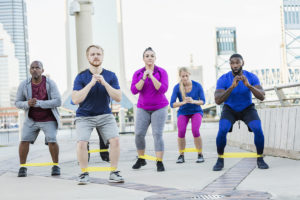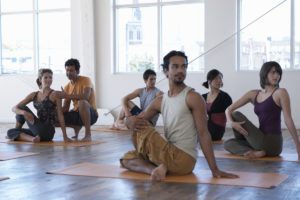Exercise/Class Formats
Sample Class: Band Blast!
If you want to keep participants engaged and challenged, this high-energy class will do the trick. Break out the exercise bands and add targeted strength moves to high-intensity intervals. This format includes three phases, each consisting of one Tabata round followed by four resistance exercises. Bands are safe, easy to use and portable, making this a great class to offer in any location.
What Is the Cause of Muscle Cramps?
Muscle cramps can stop athletes in their tracks. Although they usually self-extinguish within seconds or minutes, the abrupt, harsh, involuntary muscle contractions can cause mild-to-severe agony and immobility, often accompanied by knotting of the affected muscle (Minetto et al. 2013). And cramps are common; 50%–60% of healthy people suffer muscle cramps during exercise, sleep or pregnancy or after vigorous physical exertion (Giuriato et al. 2018).
Sample Class: Seated Exercises for Older Adults
Older adults are more susceptible to deficits in cardiovascular fitness, muscle mass, strength and power, which may ultimately lead to losses in physical function. The following chair-based format focuses on improving outcomes for older participants, especially those who may need the support of a chair during exercise. Ready, Set, Sit! offers the variety of three 15-minute training segments (cardiovascular, high intensity and strength/power), while targeting important components that boost overall function.
Cultural Appropriation in Yoga
Yoga teachers will already be well aware that the yamas are one of the eight limbs of yoga. According to Patanjali’s Yoga Sutras, the word yamas can be translated as “abstinences”; in other words, these are things yogis should avoid doing (Satchidananda 2012).
Exercise Reduces Colon Cancer Growth
Colon cancer cell growth slows immediately after a HIIT session, according to a pilot study published in the Journal of Physiology (2019; 597 [8], 2177-84). More physical activity is linked with a lower death risk for people with colorectal cancer.
High-Cadence Cycling and Recreational Cyclists
A recent study supports indoor cycling instructors who urge students not to pedal at a cadence above 90 revolutions per minute. Researchers found that at 90 rpm and beyond, pedal forces exerted by recreational cyclists decreased, heart rate increased by 15%, and exercise efficiency and skeletal muscle oxygenation declined.
The study appeared in the International Journal of Sports Medicine (2019; 40 [5], 305–11).
Muscular Strength and Mental Well-Being
In a study of midlife women in Singapore, weak upper- and lower-body strength was associated with depression and anxiety. Researchers analyzed data from 1,159 healthy women ages 45–69 for physical activity, physical performance, lifestyle choices, reproductive health, sociodemographic characteristics, and depression and anxiety symptoms. Weak handgrip strength and poor lower-body strength were associated with elevated symptoms of depression and/or anxiety. Fifteen percent of participants reported depression and/or anxiety.
High-Volume, High-Intensity Exercise Is Safe for Men
No need for concern about increased death risk from heart disease among experienced middle-aged exercisers who engage in high-intensity activity, at least if they’re male. Findings from a 10-year study of 21,758 generally healthy, very active men—like marathon runners, cyclists and swimmers—showed that even for those with higher coronary-artery calcium levels, athletic pursuits did not elevate risk of death.
Complex Training: Pairing for Power
If you work with athletes, you’ve likely run into the challenge of how to incorporate power components into their already-packed training schedules. Whether you’re working with a clutch outfielder, a center or a lineman, your client’s athletic skills need refinement, and power is one aspect that requires attention. Trainers typically program resistance training to develop strength and plyometric drills to improve speed.
A Case for Breakfast Before a Workout
Should you eat breakfast before a workout? A new study has confirmed that eating breakfast makes a difference.
Training Techniques for High-Performance Masters Athletes
Trainers and coaches can use examples of elite performances and aging research to develop training protocols for masters athletes.
Use Breath to Improve Core Stability
When your participants ask about their core muscles, they’re most likely referring to the lauded “six-pack.” As a fitness instructor, you may think about transversus abdominis, obliques and pelvic-floor muscles. But almost everyone tends to forget about the diaphragm.
Sample Class: Every Minute on the Minute
If you enjoy teaching (and doing) high-intensity classes, this workout is for you! The “every minute on the minute” (EMOM) protocol is fun, fast-moving and challenging. You start a predetermined number of reps at the top of a minute and rest for the time you have left until the next minute begins.
Men’s Health Research Review
Men: Are you exercising and eating healthfully but not losing the weight you want? The good news is that there are more benefits to these two habits than just weight loss.
Megan Senger, professional fitness writer/editor and fitness instructor based in North Carolina, has summarized a few studies that center on men’s wellness, with comments on what the findings may mean for you.
Gamify the Fitness Class Cooldown
There are 5 minutes left in your class, the energy is high, and everyone is sweating and having a great time. As you wrap up the last set, participants cheer and exchange high-fives to celebrate another awesome workout. You turn the music down to prepare for the cooldown, then you look up—and notice that people are packing up and leaving.
Sample Class: Tabata for Every Rider
This indoor cycling routine introduces Tabata-inspired intervals that provide a great workout for both beginner and advanced cyclists.
Are 10,000 Steps Necessary?
Are some of your clients obsessed with achieving their step counts every day? While 10,000 steps is a popular marker, it turns out that taking as few as 4,400 steps per day is associated with a lower risk of death for women with a mean age of 72 years.
“Clearly, even a modest number of steps was related to lower mortality rate among these older women,” said principal investigator I-Min Lee, MBBS ScD, at Brigham and Women’s Hospital in Boston.
First-Time Marathon Training Has Anti-Aging Effect
Here’s a good reason to encourage your midlife clients to try an inaugural running event. First-time marathon runners who trained for 6 months saw a 4-year reduction in arterial age, according to study findings presented at EuroCMR 2019, a scientific congress of the European Society of Cardiology.
Minimalist Shoes and Stronger Foot Muscles
Minimalism is trending in many areas of life, including athletic shoes, with many fans touting numerous benefits. But does the evidence support the hype? Yes, according to research findings published in Medicine & Science in Sports & Exercise (2018; doi:10.1249/MSS.0000000000001751). Walking in minimalist shoes is as effective as foot-strengthening exercises and may result in better compliance than doing specific exercises.
The REAL Scoop on Protein Powders
Protein powders, especially the whey variety, have long been glorified in fitness circles for their muscle-building benefits. “Pump some iron and chug back a protein shake” is a preferred muscle-making formula.



















